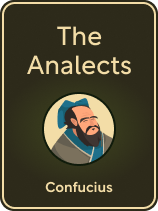

This article is an excerpt from the Shortform book guide to "The Analects" by Confucius. Shortform has the world's best summaries and analyses of books you should be reading.
Like this article? Sign up for a free trial here.
What’s the best way to learn about the world? How can you avoid telling lies, even by accident? How might you get people to trust you as a leader?
These are just a few questions that Confucius answers in The Analects, a collection of his philosophies. The teachings cover topics such as showing respect for your parents, living a life of integrity, the value of hard work, and the Chinese principles of ren and wuwei.
Continue reading for an overview of one of the foundational books of Confucianism.
Overview of The Analects
Confucius is one of the most famous philosophers in history, but what did he actually say? The Analects is a collection of Confucius’s teachings compiled into twenty chapters by his most devoted students. In it, you’ll find lessons about how to be a good learner, person, and leader.
Confucius lived from 551 to 479 BC, during the Chinese Zhou dynasty. He was a renowned teacher and government advisor. His teachings formed the basis of Confucianism, one of the most prominent philosophies in China and one that’s still widely studied today. We’ve based this overview on the 2014 Penguin Classics edition of The Analects, which is translated by and features commentary from historian Annping Chin.
(Shortform note: There’s some debate over whether Confucianism is a philosophy or a religion. Confucius’s teachings were based on an older Zhou religion, but Confucianism itself has no gods or prayers—it’s a system of ethics and secular practices designed to help people achieve happiness and prosperity.)
We’ve arranged the lessons found within the 20 chapters of The Analects into four key topics. We’ll begin with a brief overview of the traditional beliefs and texts that form the foundation of Confucianism. We’ll then review Confucius’s lessons about how to learn, how to conduct yourself, and how to be an effective leader.
Learning From Traditions
Confucius believed that the best way to learn about the world was to study the past, meaning both history and religion. In particular, he admired the early years of the Zhou dynasty (established in 1046 BC), and he strove to bring back the values and practices of that time.
Confucius says several times throughout The Analects that he wrote nothing and discovered nothing. His teachings all come from classic works of the early Zhou dynasty, and the books he’s credited with writing are compilations of traditional beliefs and practices. In other words, Confucius doesn’t think he deserves credit for discovering or coming up with any new ideas—only for repopularizing old ideas.
Traditional Values: Respect and Family Obligation
In keeping with traditional Zhou values, Confucius places great value on respecting others, especially your parents. He says that respect for your parents is the foundation of being a good person: If you learn proper respect for your parents as a child, you’ll continue to respect and obey your superiors, meaning that you’ll become a good worker and won’t cause any trouble.
If you believe that your parents are doing something wrong (either legally or morally), gently try to correct them, Confucius advises. However, don’t directly challenge them, and stay respectful even if they don’t listen to you. If they’re unwilling to change, don’t press the matter.
Traditional Practices
In addition to emphasizing traditional values, Confucius underscores the importance of traditional practices. The text Confucius references most often is the Book of Rites, which describes the traditional ceremonies, administrative practices, and social etiquette of the Zhou dynasty. Many of his lessons are about following the Rites; Confucius believed that the early Zhou dynasty had been a golden age for China, and he hoped to bring back the prosperity of those days through these traditional practices.
How to Be a Good Learner
Although Confucius urged people to live according to traditional beliefs and practices, he also highly valued learning new things. The Analects contains several passages in which Confucius says there’s sometimes good reason to deviate from tradition because of new knowledge. We’ll begin this section by covering his insights on how to learn new ideas, and then we’ll explore his advice on learning from others.
Observe and Keep an Open Mind
According to Confucius, the best way to learn is to always be receptive to new information. In other words, no matter what you’re doing, pay close attention and look for things to learn. However, Confucius cautions against studying everything you encounter. Instead, look specifically for knowledge that will benefit you.
Confucius’s Teaching Style
Confucius wanted people to observe, learn, and discover their own solutions to problems. Therefore, in his role as a teacher, he rarely gave his students the answers to their questions. He would instead provide a hint and insist that they figure out the rest themselves. He’d urge them to consider every question, even simple ones, from all possible angles. Using this method, Confucius didn’t teach people what to think, but rather how to think.
Learn From Others
In addition to observing your surroundings and thinking about your tasks, Confucius urges you to learn whatever you can from other people.
One way to do this, as we’ve said before, is through open-minded observation: When you’re with others, observe their good qualities (such as humility, honesty, or generosity) and try to emulate them. At the same time, look for bad qualities (such as pride, selfishness, or cruelty) and try to correct those faults in yourself.
However, don’t just learn from others through observation, welcome opportunities for them to actively teach you. Confucius recommends asking questions whenever possible and always welcoming the chance to be corrected. If someone proves you wrong about something, thank them for teaching you rather than getting upset that you made a mistake.
Confucius cautions you to make sure you’re learning from the right people. The people you spend time with will influence your thoughts and your behavior, so make sure you’re surrounding yourself with good influences.
First, he says, only befriend people who are kind and respectful; in other words, people whose behavior is worth emulating. Second, seek out people who share your artistic and cultural interests. When you have common interests with your friends, you can help each other to develop your understanding and appreciation of those things.
How to Find the Right People
Naturally, finding the right people to befriend means that you have to know how to evaluate people. As we discussed previously, you can evaluate people by closely observing their good and bad qualities. Now, however, Confucius specifically recommends judging people’s actions rather than their words. It’s easy for people to say the right things and pretend that they have strong moral character, but much more difficult for them to actually do the right things.
You can gain additional insight into people’s characters, and whether they share your artistic and cultural interests, by observing where they feel most at home. Make sure that you and your friends are happy to spend time in the same places; that’s a good sign that your interests and personalities are compatible.
How to Be a Good Person
Confucius generally encourages students to think and learn for themselves, but he offers more direct advice about morality. He says that a single word can guide everything you do: the Chinese word shu, which means don’t do to others what you wouldn’t want to be done to you.
However, while shu is a good foundation for moral behavior, Confucius adds that causing no harm isn’t enough to be a truly good person. Rather, a good person is someone who’s respectful, honest, hardworking, and kind (qualities we’ll further explore in the next few sections). In other words, to be a good person, you must do your best to make the world a better place.
In this section, we’ll highlight four of Confucius’s insights on how to be a good person.
Hard Work
As previously noted, Confucius conveys that working hard is part of being a good person. He adds that putting forth your best effort has personal benefits, so there are reasons for even a selfish person to do so. Hard work will bring you satisfaction—namely, if you always do your best, then you’ll be satisfied with your efforts regardless of their outcomes. On the other hand, if you don’t give your best effort, you’ll feel unsettled and guilty because you’ll know that you could have done more.
Confucius also advises you to adjust your life so that you can do your best. This could mean changing where you live, where you work, who you spend time with, or anything else—if something gets in the way of you living well and doing your best work, it’s not worth holding on to.
Honesty
Confucius teaches that honesty is another key part of proper conduct—a good person must be trustworthy. When Confucius discusses honesty, he doesn’t just mean not telling lies. You should also try to be honest in your thoughts. In other words, avoid unfair biases; strive to see people, things, and situations as they are instead of as you expect (or want) them to be.
Honesty also means being frank about your skills and knowledge: Don’t inflate your abilities, but don’t sell yourself short, either. In short, know your own worth and be honest about it.
To avoid accidentally telling lies, Confucius recommends not talking about your plans or goals because you’ll be ashamed if your actions don’t live up to your words. Instead, take action first, and only talk about it afterward.
Finally, Confucius says that an honest person must avoid hypocrisy. He suggests that you ask yourself at the end of each day whether you gave any advice that you don’t personally follow. If so, change either your actions or your teachings so that you can avoid such hypocrisy in the future.
Altruism
Since Confucius defines a good person as someone who strives to improve the world, he believes that good people must be altruistic: They act to help others rather than for personal gain. Confucius describes this using the Chinese word ren, translated as “humaneness” or “humanity.” For him, ren means always striving to live up to the moral standards he sets throughout the Analects, no matter what. He says that good people would rather die than compromise their morals.
Confucius also offers two concrete suggestions for living altruistically. First, should you find yourself in an unfair or immoral culture, it’s acceptable to say whatever you must to protect yourself—but under no circumstances should you do anything immoral or cruel. Have the courage to live by your values at any cost.
Second, frugality is another important aspect of altruism. Since altruism is the opposite of selfishness, altruistic people try not to take more than they need. They’re happy to live modestly, with a small home and simple food. Confucius says obsessing over material goods when you already have enough to live on is a waste of energy that would be better spent helping others.
Effortless Action
Confucius teaches that, for good people, proper conduct seems effortless—they simply know the right thing to do and do it. For that reason, he considers effortless action to be proof of good moral character. To describe this concept, he uses the term wuwei, a Chinese word that can mean action without effort or simply inaction.
Effortless action seems to go against the earlier principle of hard work, but that’s because the work of wuwei is internal and therefore invisible to others. In other words, instead of struggling to do the right thing (external, visible effort), you struggle to turn yourself into the kind of person who always does the right thing (internal, invisible effort). One of the main benefits of effortless action is that it keeps you focused on things you can control: namely, the internal, invisible effort of shaping your actions and qualifications.
How to Be a Good Leader
Confucius says that the main goal of his lessons is to turn you into an effective leader. A good leader must be learned and moral, which we’ve covered in the previous sections. They must also realize their own potential and help others realize theirs. Confucius’s lessons about how to do this boil down to using your resources wisely. Time and people are two of a leader’s most important (and most limited) resources. Getting the most out of those two resources is the hallmark of an effective leader.
Get the Most From Your Time
Confucius offers advice for how to use time wisely in both the short and long term to maximize productivity. In the short term, focus on your own duties each day; don’t interfere with others’ tasks except to correct their mistakes. Also, help other people spend their time wisely by being realistic about what they can accomplish in a day. If you assign them new duties, make sure you’re taking away other duties instead of just piling on more tasks and assuming they’ll all get done.
For the long term, set big goals, then work toward them slowly and steadily. If you don’t plan for the future, you’ll constantly scramble to deal with crises in the present, which is stressful and inefficient.
Finally, note that using time effectively doesn’t mean trying to get things done as quickly as possible—rather, Confucius advises you to take whatever time you need to do things correctly. Pay close attention to detail, and follow all applicable rules and procedures; don’t cut corners, and don’t allow your workers to do so either.
Get the Most From Your People
The essence of leadership is getting the best work possible out of your people. Confucius gives several pieces of advice on how to do so.
Tip 1: Foster Trust
First and foremost, your people must trust you as a leader; otherwise, you won’t be able to accomplish anything. Confucius believes that trust is essential because not everyone will understand the reasons behind your orders. Therefore, you need to know that your people will do what you ask out of trust, even if they don’t understand why it needs to be done.
Tip 2: Set an Example
Second, trust will enable you to coach your workers effectively and correct their mistakes—if they don’t trust you, they won’t take your coaching to heart. Confucius suggests setting an example by publicly admitting and correcting your own mistakes.
Doing so will encourage your people to correct their mistakes without waiting for your orders. It’ll also stop people from resenting you when you do have to correct them because they know that you treat yourself the same way; they know that you’re not just picking on them.
Tip 3: Reward Your Workers
People also like to know that they’ll be recognized for their work. Therefore, reward your best workers with recognition, promotions, and bonuses to encourage them to continue doing good work for you. Confucius notes an additional benefit of this tactic: People who don’t get rewarded will either leave or strive to do better work in hopes of getting their own reward. Either outcome works to your benefit.
Tip 4: Be Honest With Your Superiors
Finally, Confucius notes, even leaders usually have people above them in the hierarchy, and it’s important that they trust you as well. So, when dealing with your superiors, speak honestly and frankly—prove to them that you’re trustworthy, and get them used to hearing you speak your mind.

———End of Preview———
Like what you just read? Read the rest of the world's best book summary and analysis of Confucius's "The Analects" at Shortform.
Here's what you'll find in our full The Analects summary:
- A collection of Confucius's teachings compiled by his students
- Lessons about how to be a good learner, person, and leader
- Concrete methods for putting Confucius’s teachings into practice






